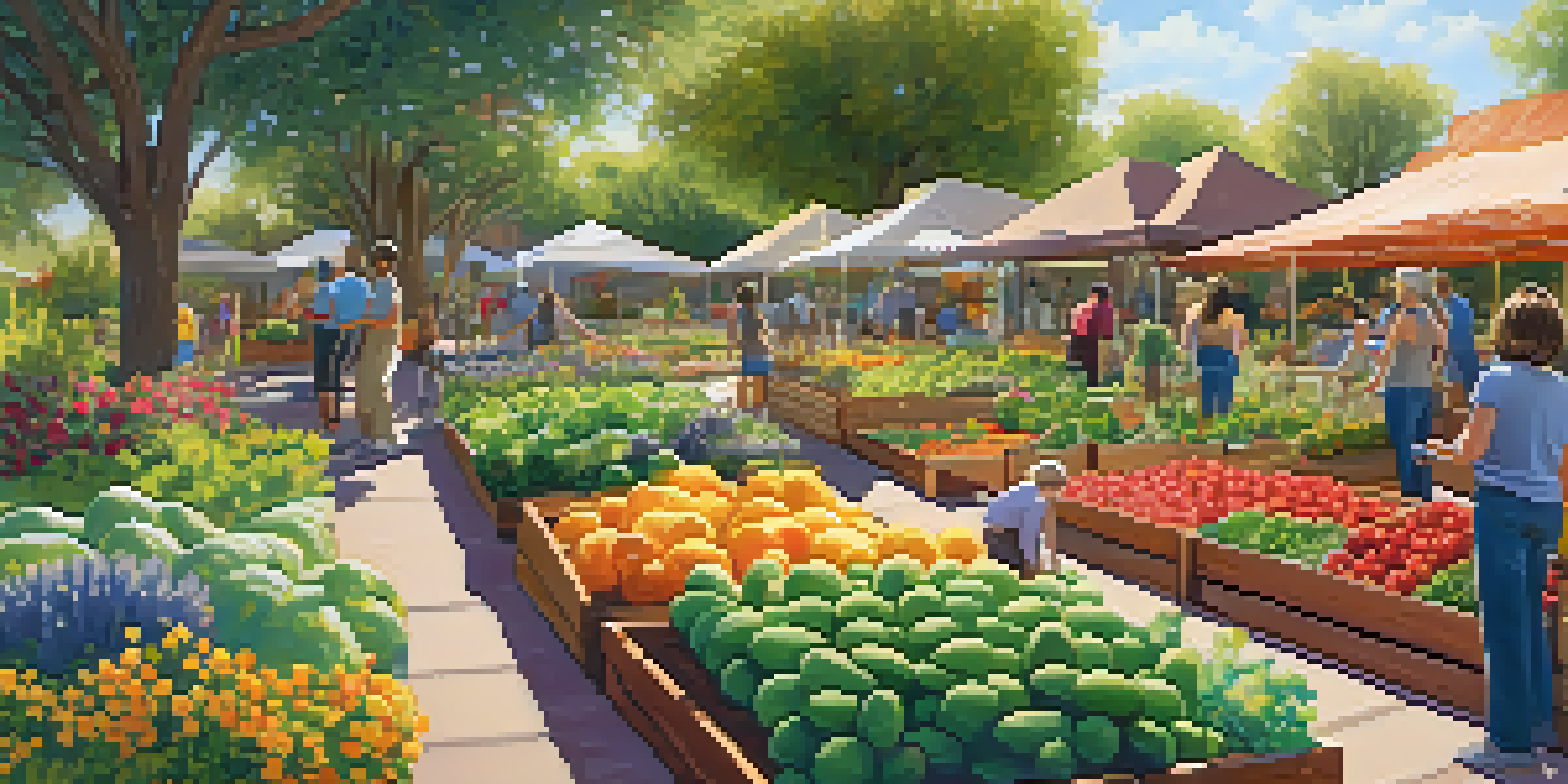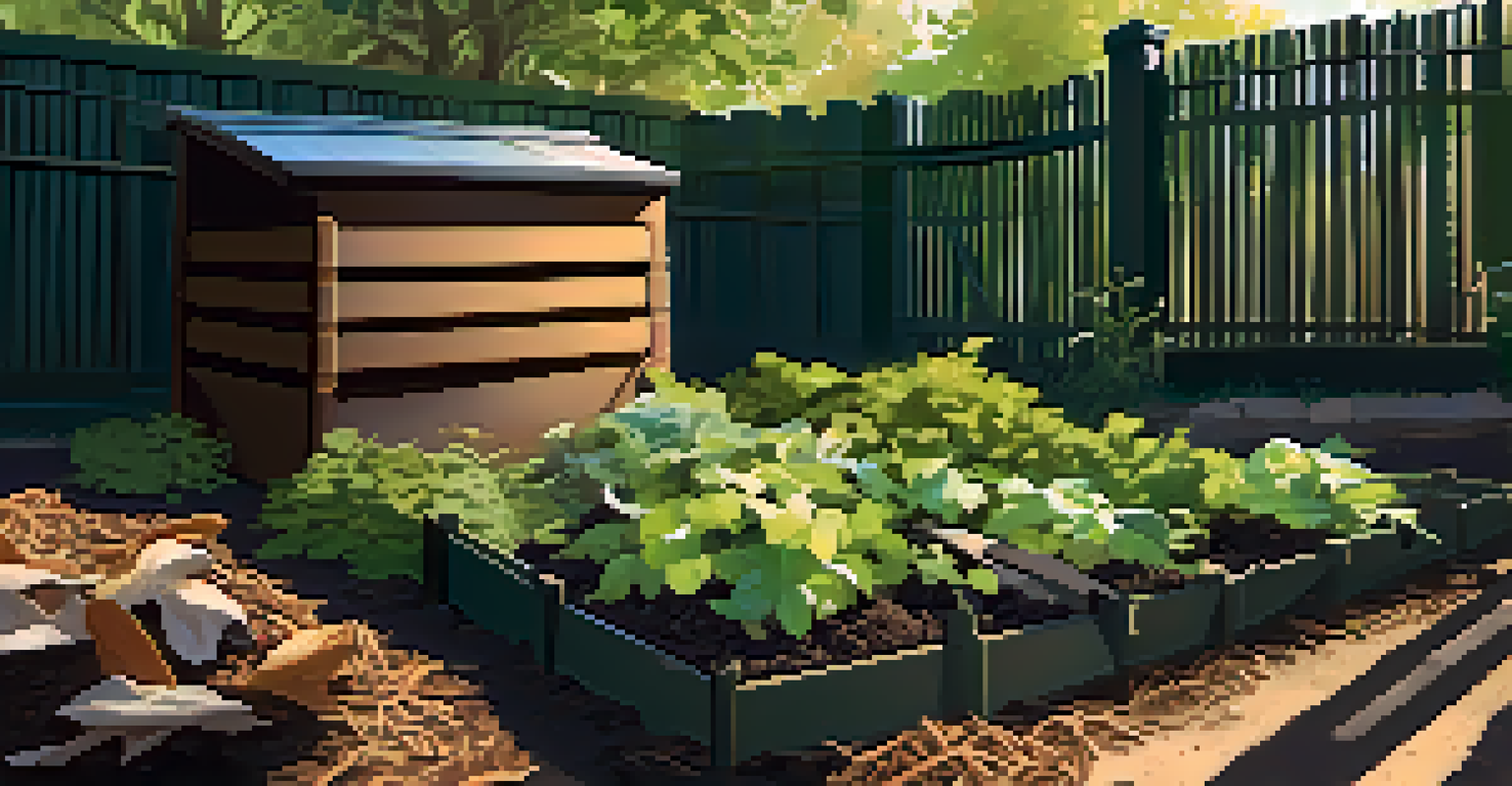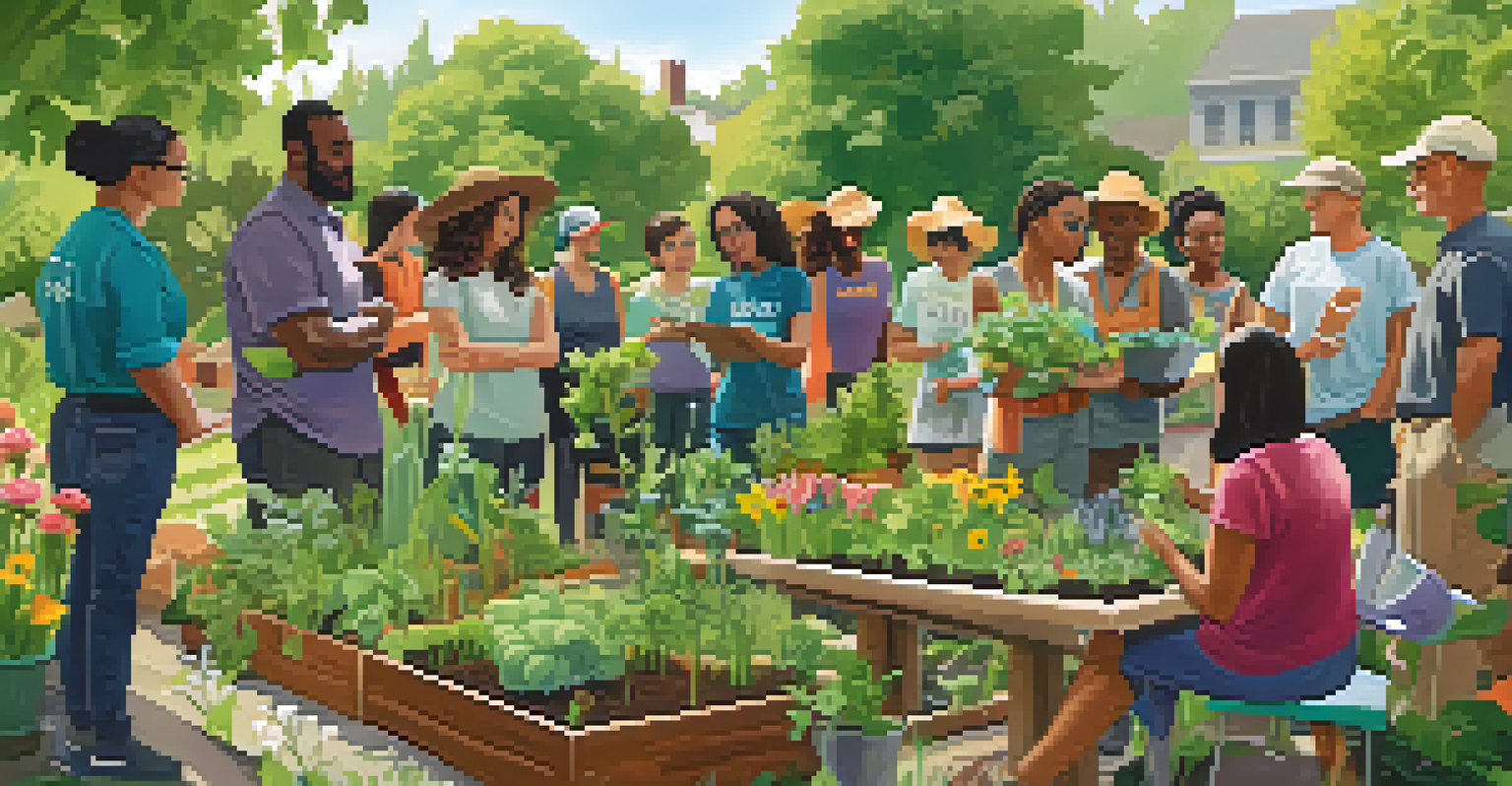Exploring Community Gardens in Scottsdale for Sustainable Living

What Are Community Gardens and Their Benefits?
Community gardens are shared spaces where individuals grow fruits, vegetables, and flowers, fostering a sense of community and sustainability. These gardens not only provide fresh produce but also serve as hubs for social interaction and education. By participating in a community garden, individuals can learn valuable gardening skills while contributing to local food systems.
To plant a garden is to believe in tomorrow.
One of the most significant benefits of community gardens is their ability to enhance food security. In areas where access to fresh produce can be limited, these gardens provide a vital source of nutrition and promote healthier eating habits. Additionally, growing your own food reduces reliance on grocery stores, which often rely on environmentally taxing supply chains.
Moreover, community gardens contribute to environmental sustainability. They help improve air quality, support biodiversity, and promote the responsible use of land. By transforming underutilized spaces into vibrant gardens, community members can positively impact their neighborhoods and inspire others to adopt more sustainable practices.
A Brief History of Community Gardens in Scottsdale
Scottsdale's community gardening journey began in the late 20th century as a response to urbanization and the growing desire for greener spaces. Local residents recognized the need for sustainable food sources and came together to create gardens that would benefit the entire community. Over the years, these gardens have evolved into vibrant spaces that blend nature with community spirit.

In the early 2000s, city officials and local organizations began supporting community garden initiatives, providing resources and assistance to eager gardeners. This collaboration helped to establish a network of gardens across Scottsdale, each with its unique character and community focus. Today, these gardens serve as models for sustainability and community engagement.
Community Gardens Enhance Food Security
These gardens provide vital access to fresh produce, promoting healthier eating habits in local communities.
As community gardens grew in popularity, they also became spaces for education and outreach. Workshops on gardening techniques, composting, and sustainability practices have been organized to empower residents. This emphasis on education helps to cultivate a culture of environmental stewardship, inspiring future generations to care for their local ecosystems.
Top Community Gardens to Visit in Scottsdale
Scottsdale boasts a variety of community gardens, each offering unique experiences for visitors. One standout is the Scottsdale Community Garden, located near downtown, which features raised beds, native plants, and a strong community vibe. This garden is perfect for individuals looking to connect with fellow gardeners and learn about sustainable practices.
Gardening is a way of showing that you believe in tomorrow.
Another popular spot is the Desert Botanical Garden, which not only showcases stunning desert flora but also offers educational programs related to gardening. Visitors can explore the beauty of native plants while learning how to cultivate their own gardens at home. This garden beautifully merges education with environmental appreciation.
Lastly, the McDowell Sonoran Conservancy maintains community gardens that focus on native plants and sustainable landscaping. This initiative emphasizes the importance of preserving local ecology while providing a space for residents to engage with nature. By visiting these gardens, you can explore Scottsdale's commitment to sustainability and community involvement.
How to Get Involved in Community Gardening
Getting involved in Scottsdale's community gardens is easier than you might think! Most gardens welcome new members and often have plots available for lease. To start, check out local gardening associations or the city's website for listings of community gardens and their contact information.
Participating in community gardening events can also be a great way to meet fellow gardeners and learn more about sustainable practices. Many gardens host workshops, volunteer days, and seasonal events that invite residents to join in the fun. These activities not only strengthen community ties but also make gardening accessible to everyone, regardless of skill level.
Sustainability Through Local Gardening
Community gardens encourage sustainable practices that lower carbon footprints and support biodiversity.
Remember, community gardening is about collaboration and sharing knowledge. Don't hesitate to reach out to experienced gardeners for tips or advice. Embrace the opportunity to learn and contribute, and you'll find that the benefits extend far beyond just growing plants.
The Role of Community Gardens in Sustainable Living
Community gardens play a crucial role in promoting sustainable living by encouraging local food production and reducing carbon footprints. By growing food close to home, gardeners significantly lower the environmental impact associated with transporting produce. This not only supports a healthier planet but also empowers individuals to take charge of their food sources.
Moreover, these gardens foster biodiversity by providing habitats for various species. In a world where urbanization threatens natural ecosystems, community gardens can help preserve local flora and fauna. They create green spaces that attract pollinators, such as bees and butterflies, which are essential for healthy ecosystems.
Additionally, community gardens serve as educational platforms for sustainable practices. From composting to water conservation techniques, gardeners learn how to care for the environment while growing food. This knowledge can then be shared with friends and family, creating a ripple effect that promotes sustainability beyond the garden's borders.
Sustainable Practices in Community Gardens
Sustainable practices are at the heart of community gardening. Many gardens implement organic methods, avoiding harmful pesticides and fertilizers that can damage the ecosystem. By using natural alternatives, gardeners not only protect their health but also contribute to the overall well-being of the environment.
Composting is another popular practice in community gardens, turning kitchen scraps and yard waste into nutrient-rich soil. This reduces landfill waste and enhances soil health, creating a more productive growing environment. Gardeners often share composting techniques, making it a community effort that benefits everyone involved.
Education and Community Engagement
Workshops and events in community gardens foster collaboration and empower residents with gardening knowledge.
Water conservation is also a key focus in Scottsdale's community gardens, given the area's arid climate. Techniques such as drip irrigation and rainwater harvesting help gardeners use water more efficiently. By adopting these practices, community gardens not only thrive but also set an example for sustainable water use in the broader community.
The Future of Community Gardens in Scottsdale
Looking ahead, the future of community gardens in Scottsdale appears bright. With growing awareness of sustainability and local food systems, more residents are likely to get involved in gardening initiatives. This shift not only benefits individual gardeners but also strengthens community bonds and promotes a healthier environment.
As urban spaces continue to evolve, integrating green spaces into city planning becomes increasingly important. Community gardens can serve as models for sustainable development, showcasing how communities can thrive alongside nature. By advocating for more gardens, residents can help shape the future of their neighborhoods.

Finally, the ongoing education and outreach efforts surrounding community gardens will ensure that sustainable living practices continue to spread. Workshops and events can inspire more people to take up gardening, fostering a culture of environmental stewardship. With this momentum, Scottsdale can become a beacon of sustainable living, one garden at a time.